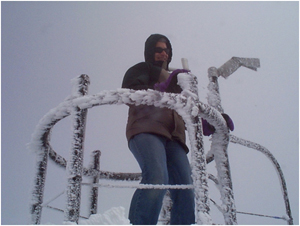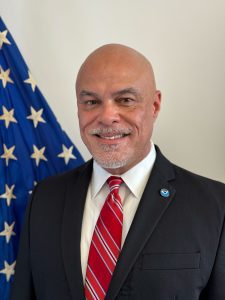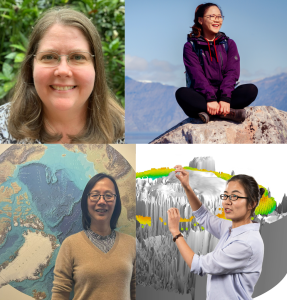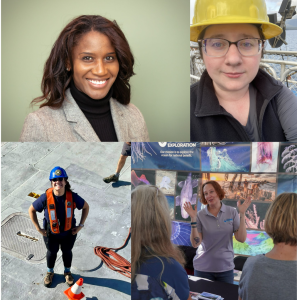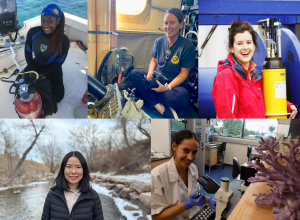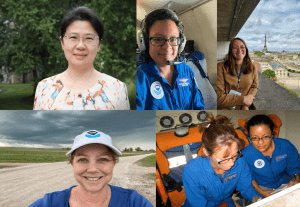NOAA Earth System Research Laboratory Scientist
Hurricanes could be churning across our open oceans towards land again soon, challenging forecasters to predict their strength and path. NOAA has researched hurricane intensity and behavior for years, yet much is still unknown about those potentially deadly monsters.
To improve hurricane forecasting, researchers in NOAA’s Earth System Research Laboratory (ESRL) in Boulder, Colo., have come up with a revolutionary way of getting closer to those mysteries swirling behind every storm. They recently put special GPS receivers on platforms in the Gulf of Mexico, 75-85 miles south of the Louisiana Coast, to continuously monitor the atmosphere over open water for the first time.
In the following interview, NOAA scientist Seth Gutman, explains why understanding water vapor content in the atmosphere is so important for all major weather events. He and his team of ERSL researchers and engineers are leading this new angle on studying hurricanes.
Why is your research important?
People normally use the satellite Global Positioning System to tell them where they are. No one really expected this, but GPS also provides us with a way to monitor water vapor in the atmosphere.
Our research (it’s definitely a team effort) is important because water vapor (water in its gaseous form) is very important but very difficult to observe. Water vapor is the means by which moisture and energy are transported to cause “weather.” It’s the raw material that makes clouds and precipitation, and it’s an ingredient in most major weather events. For example, the reason a hurricane dies when it comes ashore is because it is cut off from its main source of energy: the evaporation of sea water.
On another level, water vapor also is the most plentiful greenhouse gas that plays a critical role in the global climate system. As a result, anything that improves our ability to monitor water vapor in the atmosphere also improves our ability to forecast the weather and monitor the climate.
What do you enjoy the most about your work?
When you come across a new technique that lets you see something that hasn’t been well observed, there are all sorts of surprises, and you learn new things all the time. That’s why some people become scientists. This is cool.
Where do you do most of your work? In a lab? In field studies?
People normally use the satellite Global Positioning System to tell them where they are. No one really expected this, but GPS also provides us with a way to monitor water vapor in the atmosphere.”
I do most of my work in my office at our lab in Boulder, Colo. Living and working in Boulder definitely has its advantages, but I sure miss the time I spent in the field when we first started to investigate this technique.
At that time (the early 1990’s) there were only a few continuously operating GPS receivers collecting data around the United States, and they definitely were not used for atmospheric research. Now there are literally thousands in the United States and ten times that around the world.
What in your lab could you not live without?
I’m embarrassed to say this, but it’s PowerPoint©. These days, most of my time is spent trying to explain things about our work; like why it is important.
If you could invent any instrument to advance your research and cost were no object, what would it be? Why?
I guess I never thought about this because we’re still trying to discover all the things we can do with what we have right now. I’m sure there will be equally unexpected instruments based on improbable ideas that we can’t even conceive of in the future, so I’ll leave this question for the next generation of scientists and engineers.
When did you know you wanted to pursue science?
I’ve always been fascinated with space flight and astronomy, but my most vivid recollection of being excited about science was when my 4th-grade teacher, Mr. Murphy, dissected a frog in class and I saw the inside of something that I had no idea existed. Wanting to pursue a career in science came from one of my teachers in college. To him, science was a verb, and that inspired me greatly.
What’s at the top of your recommended reading list for someone wanting to explore a career in science?
I don’t think it matters. The best thing an adult can do is to encourage curiosity, open doors, and allow children to explore. To paraphrase one of my favorite childhood authors, Ray Bradbury, “Stuff your eyes with wonder…. See the world. It’s more fantastic than any dream made or paid for in factories.”
What part of your job as a NOAA scientist did you least expect to be doing?
Spending so much time trying to explain the importance of our scientific work to decision makers. To be successful in most careers, I think you not only need to understand what you’re doing but also be able to communicate this information to the layperson.
Who is your favorite historical scientist and why?
Hands down, it’s Arthur Stanley Eddington. He was a very talented scientist in the early 20th century who understood the implications of the General Theory of Relativity when few others did. He proposed an experiment to test the theory, then led a scientific expedition to West Africa to observe a total eclipse of the Sun and made the direct measurements that helped confirm Einstein’s theory.
Seth is a physical scientist who has been working at NOAA for 21 years. He has won awards for his research on GPS Meteorology including the Department of Commerce Gold Medal in 2006 for the development of GPS-Met and a NOAA Bronze Medal in 2010 for innovative contributions to the development of the Coastal Atmospheric River Monitoring and Early Warning System.
